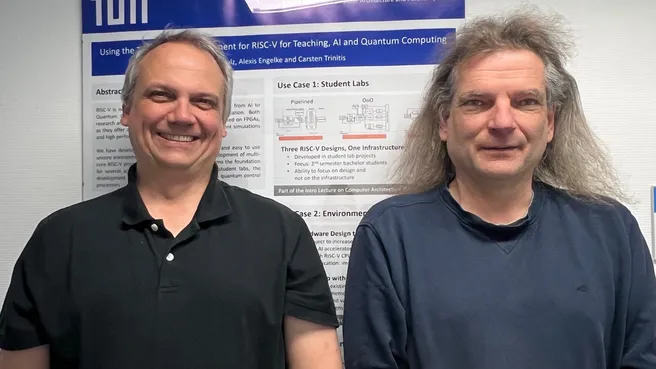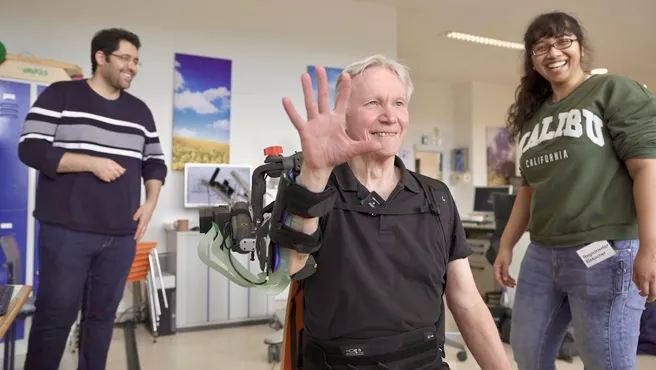Basic idea
You are a junior researcher and would like to compile your research projects into a habilitation project with the support of a professor at the School of Computation, Information and Technology (CIT)? Here we list information on how to organize a habilitation project at CIT.
The basic idea of the habilitation procedure according to the habilitation regulations of the TUM (2005) is that a habilitation candidate is accompanied by a subject mentor in the implementation of the habilitation project. Therefore, as a habilitation candidate, you first define the goals associated with the project together with your departmental mentor and record them in a target agreement. Accordingly, the interim and final evaluations of the habilitation project address the question of how and whether these goals were achieved. The target agreement you set out at the start of your habilitation project therefore gives you control over the direction of the project and its objectives.
Organizational procedure
Below you will find all the important information on the organizational process of a habilitation project at the CIT. Detailed questions are omitted in favor of the best possible overview. You can find extensive details in the TUM Habilitation Regulations. Any questions beyond this must be clarified personally – in this case, please contact the Dean's Office.
Please also contact the Dean's Office if you wish to submit an application to pursue a habilitation project within the CIT.
- Please choose a professorial supervisor and discuss your habilitation project with him/her.
- Establish a Subject Mentorate Committee: Your supervisor will become your mentor.
- The chairperson of the Subject Mentorate Committee is, by default, the Vice Dean Research. He/She may delegate this function to a Department Head or APD.
- The first mentor is usually your supervisor.
- In addition, please nominate a further mentor (see section 8 of the Habilitation Regulations).
- Proof of independent teaching is provided in the form of an unpaid teaching contract approved by the School Council. The request is submitted to the School Council by your supervisor via the Dean's Office.
- You must then submit your proposal for the Subject Mentorate Committee and the title of your project to the Dean's Office, together with the registration documents (see below) and a draft target agreement (template available from the Dean's Office).
- Your papers will be forwarded to the Chairperson (Vice Dean Research) for initial review.
- If the review is successful, the application is then submitted to the School Council.
- The School Council makes a decision on your application for habilitation. You will receive a written decision from the Dean.
- In the case of a positive decision, you must now finalise your draft target agreement and have it signed by the mentor council members.
- Please submit an original, signed version of the target agreement to the Dean's Office.
- The habilitation regulations plan a period of two years between application and the interim evaluation. Should you significantly exceed this deadline, this must be briefly explained.
- A scientific lecture, in which the habilitation candidate presents his/her project, is part of the interim evaluation. The Dean's Office can supply further information on the lecture format.
- In the interim evaluation, the chairperson investigates whether the goals from the target agreement have been met and, if so, suggests in a short review note that the habilitation process be continued.
- Within this evaluation process, it is also possible to adjust the objectives of the target agreement.
- The completed interim evaluation is submitted electronically to the Dean's Office.
- From there you will receive notification of the successful interim evaluation.
The habilitation candidate presents the habilitation project to the CIT in a lecture which is open to all members of the university. The lecture is part of the interim evaluation. For more information, please contact the Dean's Office.
- The habilitation regulations plan a period of two years between the interim and the final evaluation. Should you significantly exceed this deadline, this must be briefly explained.
- Once the habilitation script has been completed, the chairperson of the Subject Mentorate Committee requests the expert opinions from the remaining members of the committee and prepares a final report.
- The final report, expert statements and habilitation script are submitted to the Dean's Office. The Dean's Office informs all professorial members of the CIT about the habilitation project and requests them to vote on the habilitation performance via electronic circulation procedure.
- If the professorial body votes unanimously in favour of accepting the habilitation performance, the Dean proposes the acceptance of the habilitation performance to the School Council at its next meeting.
- If the School Council follows the Dean's proposal, you are habilitated as of the date of this meeting.
- Please then send the following documents to the Dean's Office:
- Statement
- Summary of the habilitation script, two-fold, intended for the TUM yearbook
- Information on the compilation of the habilitation certificate
- Statistical data for the Habilitation Office
- The teaching qualification certificate is applied for and issued by the Dean's Office.
- Unfortunately, the teaching authorization/private lecturer title must be applied for separately by the Dean's Office, who can give you further information on the procedure.
- You will be invited to the next graduation ceremony.
If you would like to write a publication-based (cumulative) habilitation script, please note these special features:
- Please note in your target agreement that you are aiming for a cumulative habilitation.
- Please also note the possibilities of overlap with doctoral theses, and that the question on first authorship within the doctoral procedure are not relevant within the habilitation procedure. Therefore, a doctoral candidate can use a joint publication with a habilitation candidate for the cumulative dissertation and equally the habilitation candidate for the cumulative habilitation.
- Please write an additional summary of your results including the defined publications (20 to 50 pages).
- Instead of a finished habilitation script, submit the summary as a PDF together with a ZIP-file containing the relevant publications to the Dean's Office. Both will then be circulated as listed above (final evaluation), therefore it is essential that the publications in the ZIP-file are electronically readable for all professors (no rare formats, no password protection etc.).
- You are exempted from submitting paper copies to the Habilitation Office. However, you are requested to publish the abstract in the TUM library.
Documents for registration
The documents required for application for habilitation are specified by the Examinations Office with reference to the TUM Habilitation Regulations.
- Official certificate of good conduct (from authority to authority and not older than three months): The certificate of good conduct can be waived for members of TUM – here a photocopy of the valid employment contract or TUM appointment certificate is sufficient (no authentication needed).
- Photocopy of a university degree certificate (no authentication needed)
- Doctoral certificate (no authentication needed)
- List of teaching and lecture events held to date
- Curriculum vitae, which in particular provides information about your educational background
- List of publications
- Application form
Required documents after completion of the habilitation script
- Statement
- Summary of the habilitation script, two-fold, intended for the TUM yearbook
- Information on the compilation of the habilitation certificate
- Statistical data for the Habilitation Office
The legal basis is the TUM Habilitation Regulations. In addition, the School Council has passed the following resolutions on the implementation of habilitation procedures at the CIT:
Resolution of the CIT School Council, 19th October 2022
- The teaching qualification is verified by a "basic/advanced certificate" in university teaching.
- Proof of independent teaching can be provided, for example, by a teaching assignment.
- In order to carry out circulation votes within the CIT in a uniform manner, the following circulation regulations shall be established:
- The quorum for each circulation panel is a minimum of 20 affirmative votes in order for the habilitation to be accepted.
- In the case of circulation, the votes of the members of the mentor council concerned do not count towards achieving the quorum.
- The duration of the electronic circulation is set at 14 days in order to allow the relevant circulation body adequate time to review the documents and make their comments.
- All members of the CIT should be invited to the habilitation lecture and the lecture should take place at the CIT.
Resolution of the School Council of 15 March 2023
Chair of the Subject Mentor Council:
As a rule, the Vice Dean Research should take the chair. Where appropriate or necessary, the Vice Dean should have the option of delegating the chairmanship, for example to a Department Head or APD.
Resolution of the CIT School Council from 18th October 2023
Proof of independent teaching by habilitation candidate
As of winter semester 2023/24, proof of independent teaching by new habilitation candidates will always be provided in the form of an unpaid teaching assignment approved by the School Council.
These teaching assignments can be submitted by the supervisor for approval at any School Council meeting after the start of the habilitation procedure.
In the case of internal habilitation candidates, the teaching assignments fulfilled within this framework can be used to fulfil their regular teaching load obligations.




